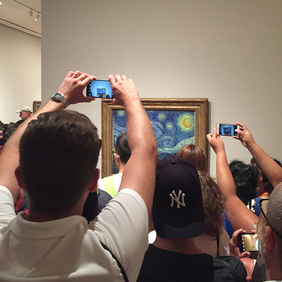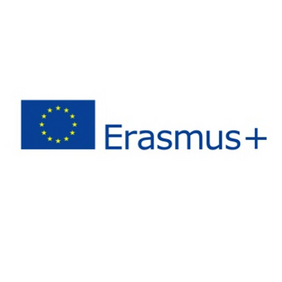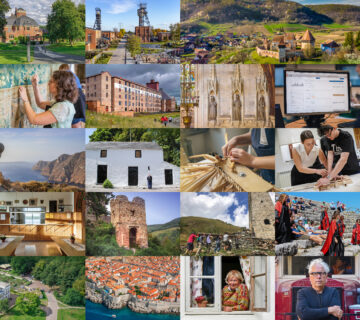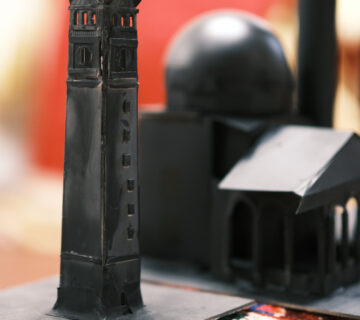
Who got the best view? Is this really a credible experience? (Image: Sandy Colvine)
We are familiar with mass tourism and the welcome democratisation of leisure enabling most sectors of society to aspire to, and enjoy, a holiday. Nevertheless, this has largely been driven by economies of scale whereby destinations become more financially accessible. This subsequently puts pressure on those same destinations as evidenced by striking images of visitors overwhelming national parks or the streets of cities such as Dubrovnik, Amsterdam or Barcelona. At the same time, a growing number of environmentally-focused actors in the tourism sector are bringing alternative, sustainable tourism products to the market that strive to generate lasting employment, greater, considerate engagement between visitors and local communities through immersive experiences while minimising environmental footprints.
The coronavirus lockdown has sharply illustrated an environmental reprieve from the pressure of tourism. Can we imagine a new more empowering model less reliant on exploiting economies of scale to their limit and the ultimate degradation, depreciation, even destruction of heritage assets?
The focus is not so much on combatting high impact-low value tourism by taking the moral high ground and pointing the finger at ‘the wrong kind of tourists’, but by contributing to an informed change in the culture of leisure while empowering communities to be actors of their tourism destinations. The sustainable tourism sector is still modest in size but growing and is, in many cases, closely aligned to the values fostered by heritage interpretation. There is the potential for greater partnership working here. Equally, through ongoing collaboration with strategic partners, such as UNESCO and the European Heritage Alliance, organisations like Interpret Europe continue to promote wider messages in the public realm about the value of heritage and meaningful engagement to foster appreciation and stewardship.
Tourism is a power for good. Reducing it in some locations may help to preserve them whereas other sites and locations need it as a matter of survival. Tourism sustains isolated island communities, wildlife in nature reserves and zoos, museums, artisanal traditions and cultural practices, yet at present its force is not sufficiently harnessed to provide the positive, measured impacts for people and places that it is capable of. This process of change must be carefully managed to not result in leakage whereby negative impacts of tourism are simply transferred from existing ‘honey pots’ to future ‘off-the-beaten-track’ destinations.
We all need the discovery and fulfilment that well-considered leisure experiences provide. They bring us pleasure and learning. Through this, we grow as human beings, as individuals and as members of society. However, in the sense of the Brundtland Commission, the current model adopted by the majority of the tourism industry is nevertheless exploiting heritage resources that are ultimately finite to a degree that future generations may not be able to meet their own needs.
Indeed, this can be encapsulated in an observation made by Freeman Tilden as far back as 1975:
“For many years, our country, and to some degree the entire world, has been buying physical comforts on a credit card with the fond hope that the creditor might forget to render the bill. Not so. Nature is a lenient creditor of man, infinitely patient with his impertinent behavior, but insistent upon the ultimate payment. The bill has now come in”.
We as individual interpreters and collectively as members of Interpret Europe can play a key role in facilitating change. This should encompass inclusive meaningful, immersive visitor experiences that place sites, hosts and people on an equal footing, promoting a shared responsibility for the conservation of heritage assets through value-based interpretation appreciable to all. This process must not be instructive but instead offer pathways to non-formal learning based on enjoyment and discovery, a process that we and Interpret Europe are ideally equipped to facilitate.
The challenge is sizeable and long-term but as with other global phenomena, such as climate change, action must be taken now to ensure that heritage assets which enrich our lives and leisure are safeguarded both in our lifetimes for those of future generations.
Sandy Colvine is a member of Interpret Europe’s Supervisory Committee and a member of IE’s Training Team. He lives near Avignon in France where he runs Mistral Translation and Consultancy. Sandy can be contacted at: alexander.colvine@interpret-europe.net.
To cite this article:
Colvine, Sandy (2020) ‘Tourism – Time for a change?’. In Interpret Europe Newsletter 2-2020, 4.
Available online: https://www.interpret-europe.net/fileadmin/Documents/publications/Newsletters/Newsletter_summer_2020.pdf




